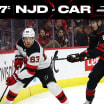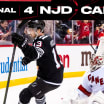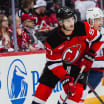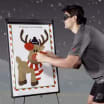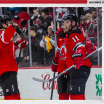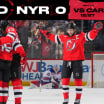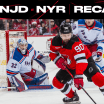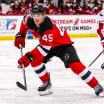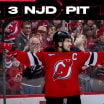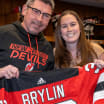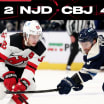New Jersey Devils Official Podcast
·
NHL Draft: Chris Peters | Speak of the Devils
The 2021 NHL Draft will be unlike any other in league history. The coronavirus disrupted and upended life as we knew it, and that extended into the world of hockey, especially when it comes to scouting.
The fallout from COVID-19 resulted in the complete cancelation of play for the Ontario Hockey League, limited play - 20-something games and no playoffs - for the Western Hockey League and an inability for many scouts to view prospects and games in person.
Though most NHL Drafts are difficult to foretell, the circumstances surrounding 2021 may make it the most unpredictable and chaotic draft in league history.
"It's been a weird year. It's been a weird ride," said Chris Peters, writer of Hockey Sense on Substack and host of the Talking Hockey Sense podcast. "There are a whole bunch of different ways this draft could go, and we don't know how that's going to play out.
"We assume that Owen Power is going to be No. 1, but after that it's really anybody's guess. That brings a lot of excitement for people like myself when there's a little bit of drama and we're not exactly sure how it's going to go."
Peters: 'Scouting Staffs Confident in their Boards' I PODCAST
Despite the unprecedented circumstances surrounding scouting last year, Peters said most teams feel they've adequately overcome
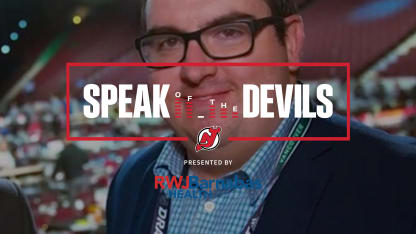
PAST DEVILS PODCASTS
SPEAK OF THE DEVILS PODCAST
New Jersey Devils Official Podcast
·
NHL Draft: Craig Button | Speak of the Devils
Mike Morreale, Steve Kournianos
Scott Clemmensen
Nico Daws
Duggan Joins the Devils
Robert Esch
Jonas Siegenthaler
Nolan Foote
Ty Smith
GM Fitzgerald and Subban
Tyce Thompson
The Original Devil: Chico Resch
Sherry Ross
Power, a 6-foot-6 defenseman for the University of Michigan, has been projected by most, if not all, draft prognosticators to be the top-overall pick in the draft and is expected to be selected by Buffalo, which holds said pick.
From there, mock drafts vary in wide ranges starting with the expansion Seattle Kraken picking at No. 2. A majority of mock drafts foresee Power's Wolverine teammate and forward Matty Beniers going second. However, others have conjectured that Seattle will opt for a defenseman with that player of choice also varying wildly.
There are two things upon which all NHL scouts seem to agree. First, that the Top-10 prospects have separated themselves from the rest of the pack, with a huge drop off in talent after 10. Second, that everyone's projections on where those 10 players fall will be nearly different on every draft board with some teams ranking the same player as high as No. 2 and others as low as No. 10.
"The most exciting part of the draft for me is in that 4-10 range, what's going to happen there," Peters said, "because that's where the consensus goes and you think about different things that have happened in recent years."
Peters recalled Detroit's decision in the 2019 draft edition to choose German defenseman Moritz Seider sixth overall. To which, Peters noted the audible gasp throughout the arena when the pick was announced.
"That's the time of the draft that I find really interesting," Peters said. "And once it gets beyond that top 10, and especially this year, I think it's going to be all over the map."
Despite all the upheaval in how teams were forced to scout this past year, whether it was using video or their previous notes on players from their play in 2019-20, most teams are comfortable with their draft boards.
"I think the scouts that were able to see players this year feel pretty confident," Peters said. "The teams that have good books on players from last season as well feel really confident about this draft and where they are. This year you're guessing a lot more.
"Everybody is in the same boat. Some teams certainly invested more in scouting, more in video, more in analytics and those things that they think will help them. Then there's others that feel 'we have the information that we need. We have enough of it.' They feel good about it. Whether that shows up on draft day is a whole other story. Of most of the teams that I've talked to, they feel pretty good."
Another aspect of this past year that has hurt the scouting process was the absence of signature events throughout the course of the season.
"We don't have the combine," Peters said. "We don't have the regular benchmarks of the season. I think that's been the really hardest thing for me to gauge. You've got the beginning, middle and end of a season. You can segment it off and do an early-season check in, a mid-season check in and an end-of-season check in."
Another difficulty in gauging players is that a few, such as defenseman Brandt Clarke and forward Mason McTavish, played in European pro leagues overseas due to the OHL's canceled season. And although seeing a player play is helpful, the hard part will be how you measure that play based on each individual league.
"It's hard to contextualize it in terms of what it means," Peters said. "Because the Slovakian pro league (where Clarke played) is not a league where you'll see a ton of defensemen come out of on an annual basis. In that league it's pretty rare for a teenage defenseman to get significant ice time. The Swiss second division (where McTavish played), is another league where it's hard to gauge. There aren't many players that are getting drafted out of that league. You take that and you take what you saw from those players last season in the OHL, as younger players, and you take the World Under-18 Championship where all those guys played.
"It's just difficult. Relative to what we've seen, how do we weigh that? And I think teams are still struggling with that as well. How do we gauge this properly because we can't contextualize it the way we normally would against their peers."
While many teams' books on the prospects may be considered "incomplete" due to lost games and normal seasonal markers, teams have adjusted to the circumstances, sometimes creatively, and have built out their boards based on the best information that they have. But with so many variables, it will make for an unexpected and unprecedented draft experience.
"This draft does not have the strength, and some of that is due to not having the full-season picture," Peters said, "and we don't have every player gauged against each other in a situation that we're used to seeing. At the same time I think the scouting staffs have invested in video, and invested in trying to get to as many live games as they could this year that was safe and allowed. And the stuff you learn from the previous season, I think that will play a much bigger role this year than it would in any other draft year.
"Based on the scouting staffs that I've talked to, they feel confident about their boards as much as they do in any other draft year."
Peters' Pick for New Jersey
William Ekland: "I think this year he took his game to a whole other level. … I think he's an elite-level winger. He was rookie of the year in the SHL this season. He was a full-time pro and played top-6 minutes at a young age, not dissimilarly from Alexander Holtz. There aren't many guys that can do that affectively. I really like what he brought to the table."
Luke Hughes: "I think he's a dynamic defenseman. I think he can change the game for a lot of teams. I think he can take over shifts. Great puck carrier. Really good in transition. Probably the best skating defenseman in this draft for me, excellent edge work. … For me personally, I think he's the second-best defenseman after Owen Power. And if he's there I think he's a difference-making defenseman. Two Hughes are better than one."
Peters' "Can't Miss" Prospect
To me, the can't miss guy of the class is Matty Beniers. I think that he impacts the game in so many different ways, the effort, the skill, the speed, his strength. He's just a highly intelligent person and player.
Peters' "High Risk, High Reward" Prospect
It's probably Sebastien Cossa, the goalie. I think his upside is phenomenal. He's huge, 6-foot-6 and fast. One of the fastest big goalies that I've seen. I think this year he really contained his game more. … He has such a gigantic ceiling. But there is no such thing as a can't miss goalie.
Peters' "Under the Radar" Prospect
For me personally, it's Isak Rosen. He's another Swedish forward. He scored seven goals at the World Under-18 Championship, which is actually a record for a Swedish player at that tournament. He's not necessarily a natural goal scorer. But he is a highly motivated, speedy, north-south kind of winger that has enough skill to get through.



